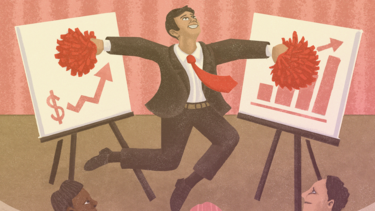Finance
The Corporation Is Centuries Older than We Thought
The genesis of the joint-stock company is usually traced to the founding of the English East India Company and the Dutch East India Company around 1600. New research co-authored by Prof. William Goetzmann says this origin story may be off by centuries.

Video: Why You Should Care about the Fed’s Inflation Policy
William English, a former Fed official who is now a professor in the practice of finance at Yale SOM, explains why the Fed shifted its approach to balancing inflation and employment, and what the change means for the economy.

How Big Investors Avoid Market Predators and Keep Trading Costs Low
Researchers have generally believed that as large institutional investors make bigger trades, their trading costs rise accordingly. Research from Yale SOM’s Tobias Moskowitz finds that they take a slow-and-steady approach to keep costs down and outsmart market predators.

Will the GameStop Rebellion Last?
We asked Yale SOM’s Kelly Shue, an expert in behavioral economics and empirical corporate finance, to explain what the GameStop phenomenon might mean for the balance of power on Wall Street.

Awaiting the Will to Ensure Financial Market Stability
In a conversation with Yale SOM’s Andrew Metrick, Paul Tucker, chair of the Systemic Risk Council and former deputy governor for financial stability at the Bank of England, says that financial markets are still facing serious stability risks.

How is Mexico Navigating the COVID Financial Crisis?
In a recent online conversation hosted by Yale SOM, Mexico’s chief central banker discussed the country’s response to the economic distress caused by COVID-19—the country’s third financial crisis in recent decades.

During the COVID-19 Crash, Investors’ Beliefs Didn’t Match Their Behavior
Despite a general wave of pessimism following the COVID-19 stock crash in March, few investors made significant changes to their portfolios, according to new research from Yale SOM’s Stefano Giglio.

Rational Order from ‘Irrational’ Actions
Prof. Shyam Sunder outlines a strain of research, drawing on complexity theory, that suggests that outcomes of a social system can be rational even if its individual participants are not rational.

A Passionate Startup Pitch Is Powerful—But Can Be Misleading
According to a new study co-authored by Yale SOM’s Song Ma, those with cheerful and enthusiastic presentations are more likely to get venture capital funding—and less likely to build successful ventures.

Holding Up a Mirror to the First Global Stock Bubble
Yale SOM’s William Goetzmann, an expert in art and finance history, showed us satirical prints documenting the first global stock bubble, three centuries ago.

A Federal Program Is Supposed to Keep Midsize Businesses Afloat. Why Isn’t It Reaching Them?
Yale SOM’s William English explains how the Main Street Lending Program fits into the array of federal stimulus efforts and offers proposals for making it work better.
